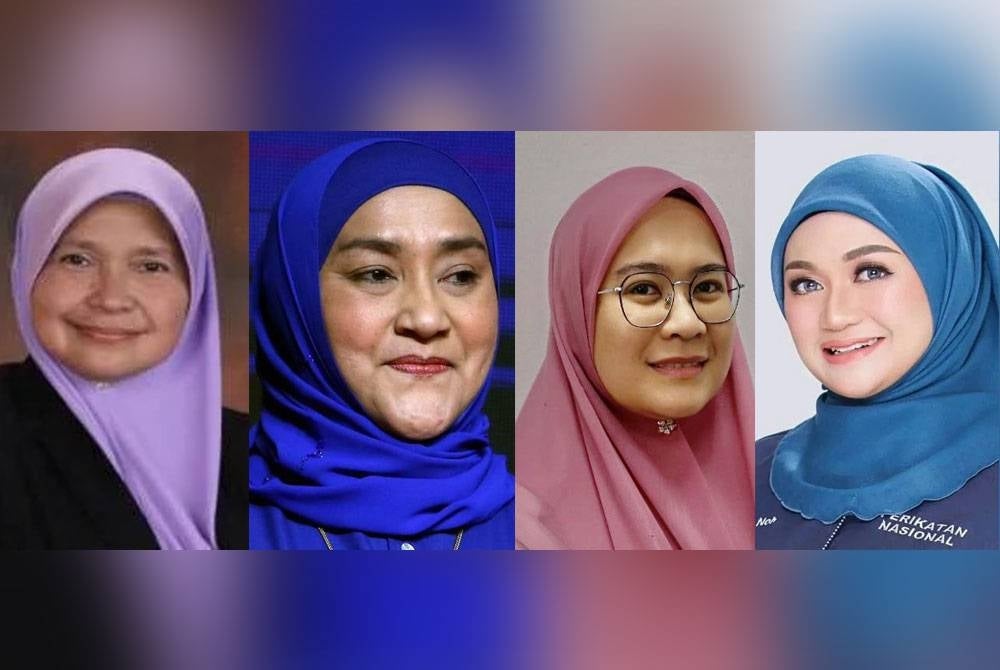SHAH ALAM - The conclusion of the state elections last Saturday revealed that out of the total of 71 women candidates from various parties, only 24 managed to secure state seats.
Within this count, Pakatan Harapan (PH) fielded 26 women candidates, resulting in 15 of them winning state seats.
The Perikatan Nasional (PN) coalition, bolstered by the alliance between Pas and Bersatu, obtained eight seats out of the 19 women candidates they fielded.
Meanwhile, BN presented 12 women candidates but could secure only one seat, which was won by Puan Sri Bibi Sharliza Mohd Khalid, wife of former Negeri Sembilan Menteri Besar Tan Sri Mohd Isa Samad.
Despite the fact that the elections demonstrated a 33.3 per cen success rate among women candidates, this achievement fell short of the target set by the 1988 National Women's Policy and the Convention on the Elimination of All Forms of Discrimination Against Women (CEDAW).
Political analyst Dr Kartini Aboo Talib @ Khalid noted that this performance equated to only 9.8 per cent or 24 out of 245 state seats being represented by women.
Kartini highlighted the success of Parti Amanah Negara (Amanah) representative Dr Hafidzah Mustakim in the Kota Lama state seat.
She pointed out that Dr Hafidzah, a medical doctor, gained voter acceptance due to her active involvement in aiding women entrepreneurs in the Siti Khadijah Market in Kelantan.
Dr Hafidzah secured victory with 9,691 votes, overcoming her opponent Pas Datuk Zamri Ismail (PN) who received 9,489 votes.
Parti Rakyat Malaysia candidate Tan Book Kian garnered 126 votes, and Independent candidate Izat Bukhary Ismail Bukhary received 85 votes.
"Dr Hafidzah's acceptance in Kelantan stems from her public clinic service and charitable contributions to residents, along with her strong track record as the Kelantan Angkatan Wanita Amanah Negara (Awan) chief, which contributed to her success," Kartini explained.
Another noteworthy success was Nurul Syazwani Noh from PN, who secured victory in the Permatang state seat.
Kartini attributed Nurul Syazwani's success to her representation of the Tanjong Karang Srikandi Muda Bersatu division and her alignment with the desire for change among voters.
Notably, Permatang is a Malay-majority area, providing her an advantage over other candidates.
In contrast, the performance of BN, which secured only one seat, prompted Dr Wan Rohila Ganti Wan Abdul Ghapar, a senior lecturer at Universiti Sultan Zainal Abidin's Faculty of International Laws and Relations, to suggest that Umno needs to take drastic actions and adapt to the changing landscape of Malaysian politics.
Wan Rohila stressed that Umno must depart from outdated practices to avoid rejection by the public.
She recommended that the remaining four years be utilised effectively, focusing on nurturing youth leadership and adapting to the evolving political environment by addressing the needs of the youth demographic.
The analysis also highlighted the failure of 10 women candidates nominated by Muda.
Wan Rohila elaborated that Muda still appears as an elitist and educated party, proficient with words and ideas; however, it has not been able to generate a significant impact.
She noted that Muda is largely associated with Syed Saddiq, and while he possesses a charismatic persona, the party itself has struggled to resonate with voters.


